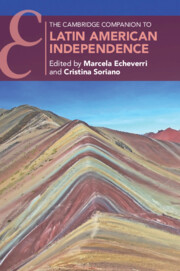Book contents
- The Cambridge Companion to Latin American Independence
- The Cambridge Companion to Latin American Independence
- Copyright page
- Dedication
- Contents
- Figures
- Maps
- Contributors
- Acknowledgments
- Maps
- Introduction
- 1 On the Origins of Latin American Independence
- 2 Constitutionalism and Representation in Ibero-America during the Independence Processes
- 3 Foreign Interaction and the Independence of Latin America
- 4 Public Opinion and Militarization during the Wars of Independence
- 5 Natural Histories of Remembrance and Forgetting
- 6 Brothers in Arms
- 7 Beyond Heroes and Heroines
- 8 Views of the Latin American Independences from the Iberian Peninsula
- 9 Shades of Unfreedom
- 10 Early Liberalism
- Bibliography
- Index
3 - Foreign Interaction and the Independence of Latin America
Local Dynamics, Atlantic Processes
Published online by Cambridge University Press: 16 March 2023
- The Cambridge Companion to Latin American Independence
- The Cambridge Companion to Latin American Independence
- Copyright page
- Dedication
- Contents
- Figures
- Maps
- Contributors
- Acknowledgments
- Maps
- Introduction
- 1 On the Origins of Latin American Independence
- 2 Constitutionalism and Representation in Ibero-America during the Independence Processes
- 3 Foreign Interaction and the Independence of Latin America
- 4 Public Opinion and Militarization during the Wars of Independence
- 5 Natural Histories of Remembrance and Forgetting
- 6 Brothers in Arms
- 7 Beyond Heroes and Heroines
- 8 Views of the Latin American Independences from the Iberian Peninsula
- 9 Shades of Unfreedom
- 10 Early Liberalism
- Bibliography
- Index
Summary
The independence of Latin America was intrinsically connected to broader Atlantic processes and networks of the Atlantic World. Throughout the process that resulted in political autonomy and republicanism in most of Spanish America, strong networks of trade and nascent diplomatic relations with Great Britain and its Caribbean colonies, the Portuguese empire and later Brazil, Haiti, St. Thomas, Curaçao, and the United States allowed revolutionaries to resist, escape, return, persist, and ultimately prevail. Rather than seeing foreign countries as outside the scope of the confrontations, this chapter integrates this international sphere into a broader geography of conflict. The commercial negotiations and diplomatic confrontations with foreign powers in the Caribbean, in the Atlantic, and in the Pacific oceans were crucial to determining the outcome than the military confrontations throughout Spanish America. The chapter focuses on the commercial networks and formal and informal diplomatic relations at play during the independence period; thus, decentering the state as the focus of analysis and paying closer attention to merchants, seafarers, envoys, and other border-crossing denizens of the Atlantic.
- Type
- Chapter
- Information
- The Cambridge Companion to Latin American Independence , pp. 91 - 119Publisher: Cambridge University PressPrint publication year: 2023

